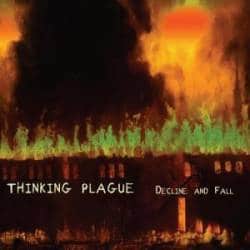Artist: Thinking Plague
Album: Decline and Fall
Thinking Plague are an extremely skillful band of singer (Elaine di Falco), guitar (Mike Johnson), bass (Dave Willey), keyboard and drums (both Kimara Sajn), and sax/ flute/ clarinets (Mark Harris). Oddly for a rock band, they almost entirely avoid distortion, even for bass and  guitar. It’s easier for me to give you adjectives about their album Decline and Fall than it is to assure you they’re compliments. “Composed”, in both the musical and emotional senses. “Difficult”. “Uncompromising”. If you started a stylistic line at, say, Maroon 5, and drew it in the direction of the Dirty Projectors (maybe halfway between Bitte Orca and Swing Lo Magellan), then kept going until you’d traveled twice your original distance, you’d be nearing Decline and Fall‘s vicinity, where no melodic or harmonic interval is ever normal and no rhythm is ever unchallenged by cross-currents.
guitar. It’s easier for me to give you adjectives about their album Decline and Fall than it is to assure you they’re compliments. “Composed”, in both the musical and emotional senses. “Difficult”. “Uncompromising”. If you started a stylistic line at, say, Maroon 5, and drew it in the direction of the Dirty Projectors (maybe halfway between Bitte Orca and Swing Lo Magellan), then kept going until you’d traveled twice your original distance, you’d be nearing Decline and Fall‘s vicinity, where no melodic or harmonic interval is ever normal and no rhythm is ever unchallenged by cross-currents.
Or you could navigate the Rock In Opposition island chain where Henry Cow (vocal albums only), the Science Group (ibid), the 5uu’s, Time of Orchids, and the Red Masque keep each other company. Thinking Plague feel more 20th-century-classical, and less heavy, than the latter three, but remain comparable. But if that’s meaningful to you, you’re probably aware of Thinking Plague already. In which case I’ll opine for you that Decline and Fall is their most stylistically consistent, melodically intricate album ever, and (for me) the first whose willfully knotty tunes fall consistently on the right side of the “hmm, interesting!” vs. “yikes – ugly!” border. My favorite Thinking Plague album remains 1989’s In This Life, which was more sprawling and varied and had shameless goth elements. But I’ll take Decline and Fall as the highlight of their mature style.
Malthusian Dances and Sleeper Cell Anthem are my favorites here, the closest approaches to “catchy”. The oft-pretty A Virtuous Man (length 11:53) shows off the players’ skills extra-well. I Cannot Fly deserves mention for Elaine di Falco’s spectacular interlocking vocals: she can’t exactly sing warmly with the melodies Mike Johnson composes for her, but she’s able to salvage the tone and grumpy charisma of a Liz Phair or a Lisa Germano, if either had spent years being rigorously trained at a school for vocal acrobats.
Liz Phair gets grumpy, when she does, about men (romantically interesting ones, record executive ones). Thinking Plague get grumpy about mankind. “See us dancing inexorably to the steps of a suicidal choreography, while the clock is ticking out the pace of collapse”, the record begins. At first you’d probably take it for wry, observational Seinfeld-style humor: “Bears and toads and fish floating dead, as blackbirds in their thousands rain down from the sky/ Fleas conspiring, forests expiring, as diseases multiply and rivers run dry” and such. But lyricist Johnson seems like a man making a moral point: he has di Falco sing “We must not place hope in fantasies. Dreaming of sprawling ‘dominion’, unspoken public opinion. Can’t we all strike it rich? Is it not the truth that God helps those who need it least?” No one, the band included, is evading blame: “We are, all of us, the bringers of hunger”, not to mention “Swirling on the currents of the deep blue sea/ thousand miles of plastic debris/ Nurdles and bottles and PCBs/ Compliments of you and me!”.
If you want redemption from Decline and Fall, you can choose. One song claims (after decrying “dogmas of hate”) “I choose to love my fellow man”. Another, far more vividly, looks forward to “Without us, the roar fades, the air starts to clear/ in green shade, life senses reprieve … Dams burst, roads crumble, shining towers tumble/ Balance is restored. And in time, the forests embrace the oceans”. The latter gets the final word. There is something inspiring, I think, in the purity of Mike Johnson’s anti-sociability, his complete disinterest in whether we enjoy his company or not. It wasn’t enough to salvage, for me, Thinking Plague‘s 2003 album a History of Madness; those melodies made my ears hurt, and I’m sure the composer didn’t mind. But these, I like. Maybe, by listening, I’m a sucker accepting his dare. But somehow, the damn thing’s kinda fun.
– Brian Block
To see the rest of our favorites, visit our Favorite Albums of 2012 page!
